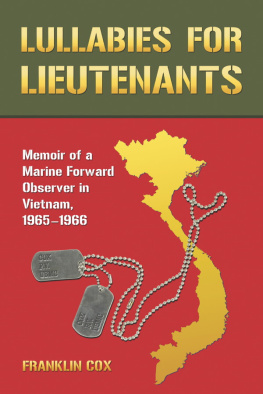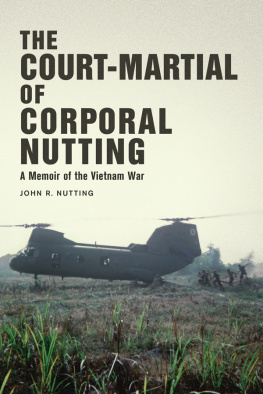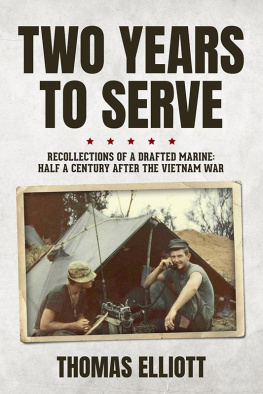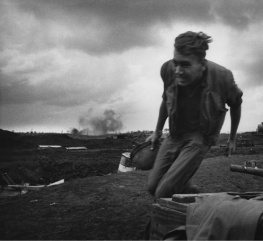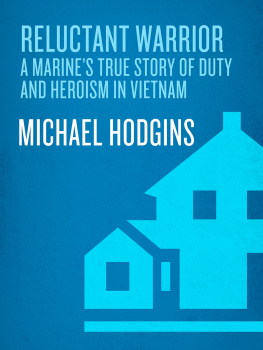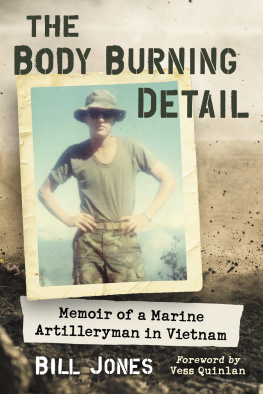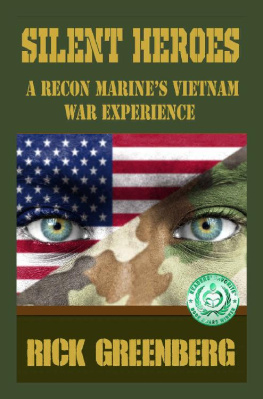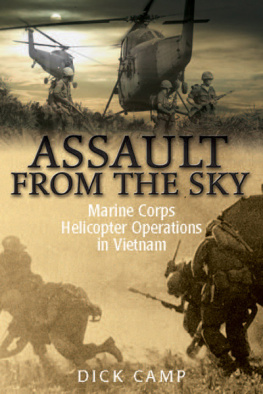.
Table of Contents
Lullabies for Lieutenants
Memoir of a Marine
Forward Observer in Vietnam,
19651966
FRANKLIN COX
McFarland & Company, Inc., Publishers
Jefferson, North Carolina, and London
LIBRARY OF CONGRESS CATALOGUING-IN-PUBLICATION DATA
Cox, Franklin, 1941
Lullabies for lieutenants : memoir of a Marine forward observer in Vietnam, 19651966 / Franklin Cox.
p. cm.
Includes bibliographical references and index.
ISBN 978-0-7864-4719-0
1. Cox, Franklin, 19412.Vietnam War, 19611975 Personal narratives, American. 3. MarinesUnited States Biography. 4. United States. Marine CorpsOfcers Biography. I. Title.
DS559.5.C687 2010
959.704'345dc22 [B] 2010004826
British Library cataloguing data are available
2010 Franklin Cox. All rights reserved
No part of this book may be reproduced or transmitted in any form or by any means, electronic or mechanical, including photocopying or recording, or by any information storage and retrieval system, without permission in writing from the publisher.
Cover images 2010 Shutterstock and 2010 Photos.com
McFarland & Company, Inc., Publishers
Box 611, Jefferson, North Carolina 28640
www.mcfarlandpub.com
To my precious children, Carolina and Frank,
who choose to ignore my many weaknesses
This book is a memoir, not a military history book. It is a personal remembrance about real events that occurred for the most part over 40 years ago. I have changed names in certain cases to respect the privacy of those people and their families.
Acknowledgments
If I mentioned all those who gave me inspiration or guidance I would run out of ink.
Most of all, I must thank my brave mother, Mary Carver Cox.
I must thank my second family, the men who served with me as young artillery Forward Observers in Vietnam in Echo Battery, Twelfth Marines. Their performance in action is well documented and their support to put this manuscript together has been exceedingly valuable. So I thank each of them: Barney Barnum, David Garner, Bob Hamel, Jim Riordan, and Jack Swallows. I also thank Dan Walsh, Harry Dellinger, and Bob Rowe, all USMC lieutenants in Vietnam and close friends.
John M. Dowd was my college roommate and is my great friend. He was an extraordinary lawyer as a Judge Advocate General Marine Corps officer just as he is today with Akin Gump Strauss Hauer & Feld, where he heads the firms criminal litigation group. His influence at History and Museums Division, Headquarters Marine Corps, helped facilitate my work. May God bless the soul of his brother, Tom, who was killed as a Marine platoon leader in the terrible killing fields south of Danang.
I thank Milam Propst and Jerry Lee Davis for helping me get started on this endeavor.
Finally, I must thank all the individual Marines I served with who showed me what courage is all about.
Preface
Marines are about the most peculiar breed of human beings I have ever witnessed. They treat their service as if it was some kind of cult, plastering their emblem on almost everything they own, making themselves up to look like insane fanatics with haircuts to ungentlemanly lengths, worshipping their Commandant almost as if he was a god, and making weird animal noises like a band of savages. Theyll fight like rabid dogs at the drop of a hat just for the sake of a little action, and are the cockiest SOBs I have ever known. Most have the foulest mouths and drink well beyond mans normal limits, but their high spirits and sense of brotherhood set them apart and, generally speaking, of the United States Marines Ive come in contact with, are the most professional soldiers and the finest men I have had the pleasure to meet.
An Anonymous Canadian Citizen
It was the first movie I ever saw. My father took me to the fabulous Fox Theater on Peachtree Street. Stars twinkled in a light royal-blue sky above the 4,600-seat colossus. It was one of the wonders of the world, an original American Top Ten special effect amphitheater. We saw the stars, each constellation drawn above us by a Creator, or something. It looked real. I expected the stardust to fall, slowly swirling and glittering, in flakes upon us as if we were outside in the languid late spring evening. We gasped with wonderment when remembering, kids my age along with fathers and grandfathers, that there was a roof above the stars. Yet the pulsating stars looked so real you could look up and throw a kiss at them just like in the backyard, except there was a roof above them.
Twenty minutes into the film John Wayne walked into his squads tent, scowling. He was wearing a cotton olive-green battle shirt and a cartridge belt crammed with clips loaded with bullets for his M-1 rifle. Emblazoned on his left breast pocket was the first acronym Id ever seen ... four letters in a row ... USMC. It lit me up.
Thats a really cool shirt, I thought. I want one of those. Someday Ill wear that shirt.
In The Sands of Iwo Jima John Wayne roared into my life: My name is Stryker, Sergeant John M. Stryker. Youre gonna be my squad, a rifle squad. You joined the Marines because you wanted to fight. Well youre gonna get your chance, and Im here to see that you know how. If I cant teach you one way, Ill teach ya another. But Im gonna get the job done. Any questions?
There were no questions. Except for one ... mine. After our flag was raised over Mount Suribachi, after the Marines had carried the battle, a solitary Nipponese sniper fired a shot through the lungs of Sergeant Stryker. The movie was almost over, the Japs were vanquished, yet John Wayne had a mortal bullet hole in his utility shirt with USMC emblazoned on it. I was devastated. Confronted with my first glimpse of death, I wonderedhow could it end like this? Decades later I saw firsthand how often those that wear that shirt, the one so hard to get, fall also, like Sergeant Stryker.
Recently while looking west from a 22-story balcony I saw in the hot summer sky soft white clouds that had been motionless like massive suspended kites stir and scuttle to the east. Streams of grey flat clouds rushed from the west to mingle with the soft cotton ones. The wind swirled and suddenly a wall of purple-violet clouds swallowed the sky. Instantly the air turned cooler as the first thump of thunder sounded. Bright flashes from lightning framed the waves of rain, which fell in a sideways spume. Rain fell on the crusted earth and the scorched pavement below for the first time in weeks. A layer of steam hovered above the asphalt below like a low fog over a swamp. The perspiration on my forehead evaporated into the sudden coolness.
When mean weather moves in with such volatility it sometimes is a reminder of similar storms decades ago in a place where the weather was usually at an extreme. Violent storms visited the Marines in Vietnam with regularity, and in the monsoon season the storms lasted for weeks.
I denied all feelings in my heart about my Vietnam experience after departing. When I was there I never thought I could escape it. When I came home I shoved its memories deep into a subconscious file, locked the cabinet drawer, and threw away the key for a long time. It was so intensely real when I was in Vietnam that once gone I renounced it, morphed its existence into a surreal cocoon, and buried it way back deep inside; the whole trip was too heavy a consideration if you wanted to get a life.
Next page
